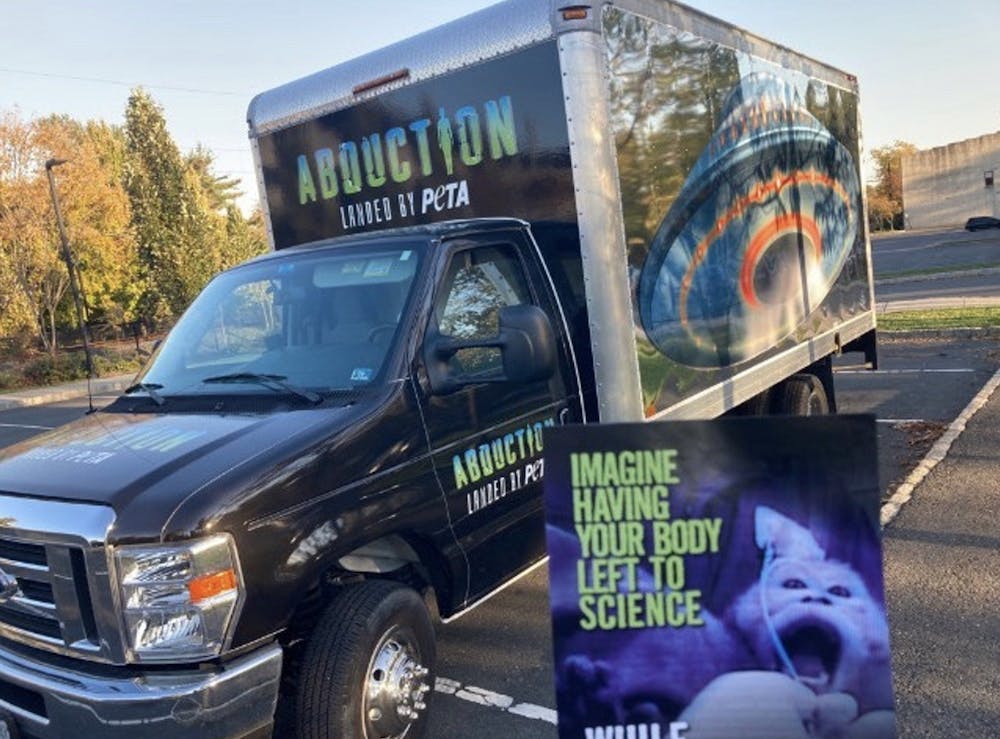On Oct. 20, People for the Ethical Treatment of Animals (PETA) arrived in Princeton to provide students with an immersive virtual reality (VR) experience. The VR experience, called “Abduction,” is part of a traveling exhibit currently touring college campuses across the country.
In anticipation of PETA’s arrival on campus, the Princeton Neuroscience Institute (PNI) adopted certain preemptive measures around “animal facility perimeter doors.” Labs within the PNI use animals for experimental purposes.
In an email to the PNI listserv on Oct. 19, Assistant Director Dr. Edwin Clayton cautioned that all faculty, staff, and students in the building on Thursday and Friday exercise vigilance of their surroundings and report suspicious individuals.
Shortly after, in a separate email sent on the same day, Clayton mentioned more preemptive measures put in place.
“The interior hallways will be locked Thursday and Friday due to concerns with animal rights activists on campus. You will be able to access the hallways using your ID so please remember to bring it with you the next two days,” he wrote.
Clayton did not respond to a request for comment from The Daily Princetonian.
The “Abduction” experience, which was administered to participants using a simple VR headset in the back of a truck, is part of PETA’s mission to promote empathy for laboratory animals that are regularly experimented upon and killed in the process of scientific research, including at some of the University’s own research facilities.
In an interview with the ‘Prince,’ Kenneth Montville, Senior Education Projects Manager for PETA, explained the educational merits of the new VR experience as an opportunity for introspection about animal welfare priorities within the context of biomedical research.
“We’re largely focusing on universities that do have cruel animal labs and many of which have received multiple federal animal welfare violations. The point is to be engaging students about the horrors of animal testing,” Montville said.
“Our highly immersive virtual reality experience helps students develop empathy for animals killed in labs by putting them in a place similar to the animals, for a few minutes, through the analogy of an alien abduction,” he added.
The VR experience takes participants into the backseat of a vehicle, with two of the subject’s friends within the VR cracking jokes from the passenger’s and driver’s seats. Then, suddenly, a distinctive, white object materializes in the sky. Intrigued, one of the friends exits the vehicle and begins to jump up and down, motioning at the unidentified flying object (UFO).
The VR world then abruptly turns white as the participant is thrust into a cold and sterile lab environment. Participants are supposed to vicariously experience the consequences of having been abducted by aliens eager to conduct research on humans, irrespective of ethical considerations, in a manner described by the PETA website as “a terrifying experience similar to what animals endure in laboratories.”

In 2014, an anonymous whistleblower notified PETA that Princeton lab employees placed at least one young marmoset monkey into an exercise ball and rolled it down the halls for their entertainment.
After this incident, PETA filed complaints with the U.S. Departments of Agriculture and Health and Human Services and issued a letter to President Christopher L. Eisgruber ’83 requesting that marmoset monkeys be relocated from PNI to a sanctuary in response to information supplied to PETA by the anonymous whistleblower.
Moreover, according to PETA’s “Campus Cruelty Reports,” the University receives the rank “Worse” for using more than 148 total animals exempted from regulatory oversight as dictated by the Animal Welfare Act (AWA), a federal law that regulates “treatment of animals in research, teaching, testing, exhibition, transport, and by dealers.”
Montville told the ‘Prince’ that “Princeton’s locking down doors because it has something to hide and we know what they don’t want people to see, such as cutting open the heads of monkeys and carving up a portion of their skulls.”
“And so the idea of an anti-animal testing, pro-human-centered model of science discourse coming to campus … the sense that the University is going to retreat behind closed doors is incredibly telling,” he added.
In response to allegations of unethical practices and cruelty made by PETA against the University’s animal experimentation protocols, University Spokesperson Michael Hotchkiss emphasized that the University prioritizes responsible animal research practices.
“The University is committed to providing humane and responsible care for animals in research. Animal research generates valuable knowledge and information that benefits society, and is subject to rigorous scientific, ethical and regulatory oversight,” Hotchkiss wrote in an email to the ‘Prince.’
“Princeton’s animal care program is accredited by AAALAC International, a voluntary accreditation program for organizations that use animals in research,” he wrote.
The PETA VR exhibit was scheduled to remain on campus from Oct. 20 to Oct. 21 but departed from campus a day early in light of the body of Misrach Ewunetie ’24 being found on campus, according to PETA’s Tasgola Bruner. Another PETA affiliate told the ‘Prince’ that the traveling VR exhibit is likely to return in the near future during a period that does not coincide with a break, to enable a broader swathe of students to experience the immersive event.
The event took place in front of Ivy Club from 10 a.m. to 4 p.m. on Thursday, Oct. 20.
Amy Ciceu is a senior writer who often covers research and COVID-19-related developments. She also serves as a Newsletter Editor. She can be reached at aciceu@princeton.edu.








